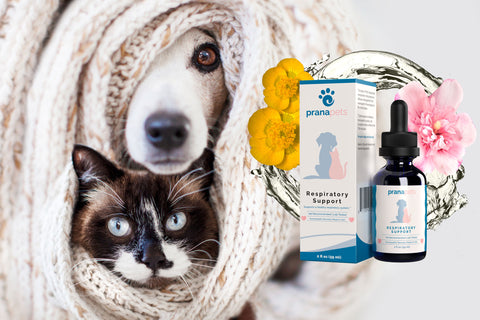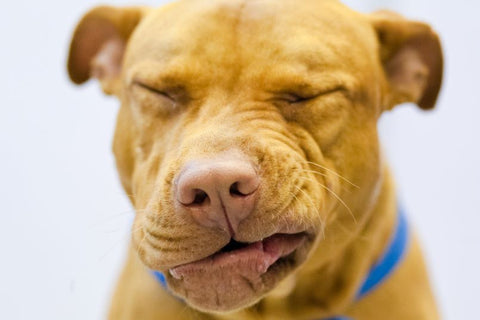

What are the common causes of wheezing and sneezing in cats and dogs?
Common causes of wheezing and sneezing in cats and dogs include respiratory infections, allergies, foreign objects or irritants in the airways, and dental issues. If your pet is exhibiting these symptoms regularly, keep reading.
Seasonal allergies don't just affect humans; our furry friends can suffer from them too. If you've noticed your dog or cat sneezing, wheezing, or scratching excessively, they may be experiencing mild cases of seasonal allergies. These allergies can also lead to respiratory problems, such as pneumonia, in pets. Fortunately, there are natural remedies available to help alleviate their symptoms and provide relief. In this guide, we'll explore common triggers of respiratory allergies in pets and introduce natural supplements designed to support their respiratory health.
Understanding Seasonal Allergies in Pets
Just like humans, dogs and cats can be allergic to a variety of environmental factors such as pollen, dust mites, and mold spores. When these allergens are inhaled, they can trigger an immune response in our four-legged friends, leading to symptoms like sneezing, coughing, itching, and watery eyes. While seasonal allergies are more commonly associated with the spring and fall months, they can occur year-round depending on the allergen. Allergy testing can be done via skin tests or blood tests to identify the specific allergens that cause reactions, allowing for better management and treatment of your pet's allergies.
Is It Seasonal Allergies or Just A Cold?
Distinguishing between seasonal allergies and a common cold can be challenging, as both may present with similar symptoms like sneezing, coughing, and watery eyes. However, the duration and pattern of symptoms can provide clues. Allergies tend to be ongoing or recurrent, especially during specific seasons or when exposed to allergens, whereas a cold typically lasts for a shorter duration before resolving on its own. If your pet's symptoms persist or worsen, consulting with a veterinarian is recommended for an accurate diagnosis and appropriate treatment plan. Below is a list of the most common symptoms of a dog or cat cold, including loss of appetite, to help you determine the cause of your pet's discomfort.
Symptoms of Common Colds in Dogs and Cats
Cat colds, also known as upper respiratory infections, are common in felines and can be caused by viruses or bacteria. Symptoms may include sneezing, nasal discharge, congestion, coughing, lethargy, and loss of appetite. Unlike allergies, colds in cats are often accompanied by fever and can lead to more serious health issues if left untreated. If you suspect your cat has a cold, it's essential to consult with a veterinarian for proper diagnosis and treatment to ensure a speedy recovery and prevent complications.
Common Symptoms of Seasonal Allergies in Pets
If your furry friend is experiencing seasonal allergies, you may notice a range of symptoms such as:
1. Excessive sneezing
2. Wheezing or coughing
3. Itchy skin or excessive scratching
4. Watery eyes
5. Runny nose
6. Ear infections
Observing some of these most common signs in your pet could indicate that they are suffering from seasonal allergies, and it's essential to address them promptly to ensure their comfort and well-being.
Untreated Allergies Can Lead to Other Issues
Untreated allergies in pets can lead to more severe health issues if left unchecked. Chronic respiratory allergies can progress to asthma or bronchitis, affecting your pet's quality of life. Inflammation from untreated allergies can also compromise their immune system, making them more susceptible to secondary infections. Other signs of untreated allergies in pets include lethargy, exercise intolerance, lack of appetite, and weight loss. By addressing and managing seasonal allergies early on, you can help prevent these complications and ensure your furry friend stays healthy and happy year-round.
Natural Remedies for Respiratory Allergies in Dogs and Cats
At Prana Pets, we understand the importance of providing natural relief for our beloved pets. That's why we've formulated a range of supplements specifically designed to support respiratory health in dogs and cats. Let's take a closer look at some of our top respiratory products and their key ingredients, along with why they are beneficial for respiratory allergies:
Respiratory Support:
- Althaea 4X: Althaea, also known as marshmallow root, has soothing properties that help relieve inflammation in the respiratory tract, making it easier for pets to breathe.
- Antimonium sulphuratum aurum 12X: This homeopathic remedy helps alleviate symptoms of respiratory congestion, such as rattling coughs and difficulty breathing.
- Arsenicum album 30C: Arsenicum is beneficial for pets experiencing wheezing and difficulty breathing, especially when aggravated by cold air or exertion.
- Chelidonium majus 6X: Chelidonium supports liver function, which can help eliminate toxins from the body and reduce allergic reactions.
- Ephedra vulgaris 6X: Ephedra acts as a bronchodilator, opening up the airways and improving respiratory function in pets with allergies.
- Inula 4X: Inula helps clear mucus from the respiratory tract, reducing congestion and promoting easier breathing.
- Kali carbonicum 30C: Kali carb is useful for pets with asthma-like symptoms, including shortness of breath and coughing.
- Kali muriaticum 6X: This remedy is beneficial for pets experiencing thick, white mucus discharge from the nose or throat.
- Lobelia inflata 6X: Lobelia helps relax the respiratory muscles, making breathing easier for pets with allergies.
- Phosphorus 30C: Phosphorus is indicated for pets with dry, hacking coughs and difficulty breathing, especially when lying down.
Cold Symptom Support:
- Aconitum napellus 12X: Aconitum is useful for pets with sudden onset symptoms, such as fever, sneezing, and congestion, often triggered by exposure to cold air.
- Arsenicum album 30C: Arsenicum is beneficial for pets with watery discharge from the nose and eyes, along with wheezing and difficulty breathing.
- Eupatorium perfoliatum 6X: Eupatorium helps relieve body aches and fever associated with respiratory infections in pets.
- Ferrum phosphoricum 6C: Ferrum phos is indicated for pets with mild respiratory symptoms, such as a low-grade fever and dry, hacking cough.
- Gelsemium sempervirens 12X: Gelsemium is beneficial for pets with weakness, fatigue, and trembling associated with respiratory infections.
- Hepar sulphur calcareum 12C: Hepar sulphur helps alleviate symptoms of sinusitis, such as nasal congestion and discharge, in pets.
- Sambucus nigra 4X: Sambucus supports respiratory health by reducing congestion and promoting easier breathing in pets with cold symptoms.
- Verbascum thapsus 4X: Verbascum helps relieve dry, hacking coughs and congestion in pets with respiratory infections.
Sinus Support:
- Euphorbium officinarum 12X: Euphorbium helps reduce inflammation and congestion in the sinuses, promoting drainage and relieving pressure.
- Hepar sulphur calcareum 12C: Hepar sulphur is beneficial for pets with thick, yellow-green nasal discharge and sinus pain.
- Kali bichromicum 30C: Kali bichromicum helps alleviate symptoms of sinusitis, including thick, stringy nasal discharge and pressure in the sinuses.
- Luffa operculata 6X: Luffa supports sinus drainage and relieves congestion in pets with allergic rhinitis.
- Pulsatilla 30C: Pulsatilla is indicated for pets with watery discharge from the nose and eyes, along with sneezing and congestion.
- Teucrum marum 12X: Teucrum helps relieve nasal congestion and promote drainage in pets with sinusitis.
These natural ingredients work synergistically to help alleviate symptoms associated with respiratory allergies, including nasal congestion, sneezing, and watery eyes.
Common Viruses That Can Cause Breathing Issues in Pets
Aside from allergies and colds, there are other common viruses that can lead to breathing issues in dogs and cats. Some of these include feline calicivirus, feline herpes virus, and canine infectious respiratory disease complex (CIRDC), or more commonly called kennel cough.
Feline Calicivirus
Feline calicivirus (FCV) is a common respiratory virus in cats that can cause symptoms like sneezing, wheezing, nasal discharge, and mouth ulcers. It spreads through direct contact with infected cats or contaminated objects. Vaccination can help prevent FCV infection, along with maintaining good hygiene practices for your feline friend.
Feline Herpesvirus
Feline herpesvirus (FHV) is another respiratory virus that affects cats, leading to symptoms such as sneezing, wheezing, nasal discharge, and eye ulcers. Stress or a weakened immune system can trigger flare-ups of the virus. Vaccination against FHV and providing a stress-free environment can help manage the condition and reduce respiratory symptoms in cats.
Canine Infectious Respiratory Disease Complex (CIRDC)
Canine infectious respiratory disease complex (CIRDC), commonly known as kennel cough, is a contagious respiratory infection in dogs. Symptoms include coughing, sne ezing, nasal discharge, and fever. It is usually spread through close contact with infected dogs in places like kennels or dog parks. Vaccination against common pathogens like Bordetella bronchiseptica and canine parainfluenza virus can help reduce the risk of CIRDC. Additionally, maintaining good hygiene practices and avoiding crowded or stressful environments can help prevent the spread of this respiratory infection among dogs.
How to Use Liquid Supplements for Dogs and Cats
Our liquid respiratory supplements for pets are easy to administer and can be safely given to dogs and cats of all ages. These home remedies for pets can be given at mealtime or administered orally 3-5 times a day in the following amounts:
- Dogs and Cats under 20 lb: 10 drops
- Dogs and Cats 20-50 lb: 15 drops
- Dogs over 50 lb: 20 drops
Note that these amounts are per administration, and not for an entire day. For optimal results, use these remedies for at least one month to start. It is generally advised to begin at a low dose (ie: 10 drops twice a day) and slowly increase the amount over the span of a week or two. You may also take the total number of drops per day and split that amount between morning and evening (or breakfast and dinner) if you are not able to administer 3-5 times per day.
When To Consult A Vet About Dog or Cat Wheezing and Sneezing
If your dog or cat is experiencing persistent wheezing, sneezing, or other respiratory symptoms despite using natural remedies like Verbascum thapsus 4X, Sinus Support, and Teucrum marum 12X, it is crucial to seek veterinary advice. Chronic respiratory issues could indicate underlying health conditions that require professional diagnosis and treatment.
Ignoring ongoing respiratory distress in pets can lead to worsened symptoms and discomfort. A veterinarian can provide a comprehensive assessment, conduct any necessary tests, and recommend an appropriate course of action to manage your pet's respiratory health effectively. Early intervention is key in addressing any potential underlying cause of the wheezing and sneezing and ensuring your furry friend's well-being through proper veterinary care.
Remember, while natural remedies can offer relief for mild symptoms, severe or persistent wheezing, sneezing, or nasal discharge should always be evaluated by a veterinarian. Your pet's health and comfort are top priorities, so don't hesitate to seek professional help when needed.
Conclusion
Don't let seasonal allergies dampen your pet's spirits. With the help of natural supplements, you can provide relief and support for their respiratory health. Say goodbye to sneezing and wheezing, and hello to happier, healthier pets!
Remember, while our supplements can help alleviate symptoms, it's essential to also minimize your pet's exposure to allergens whenever possible. Keep indoor environments clean, bathe your pet regularly, and consult with your veterinarian for comprehensive allergy management strategies. Together, we can help our furry friends breathe easier and enjoy the great outdoors allergen-free!








